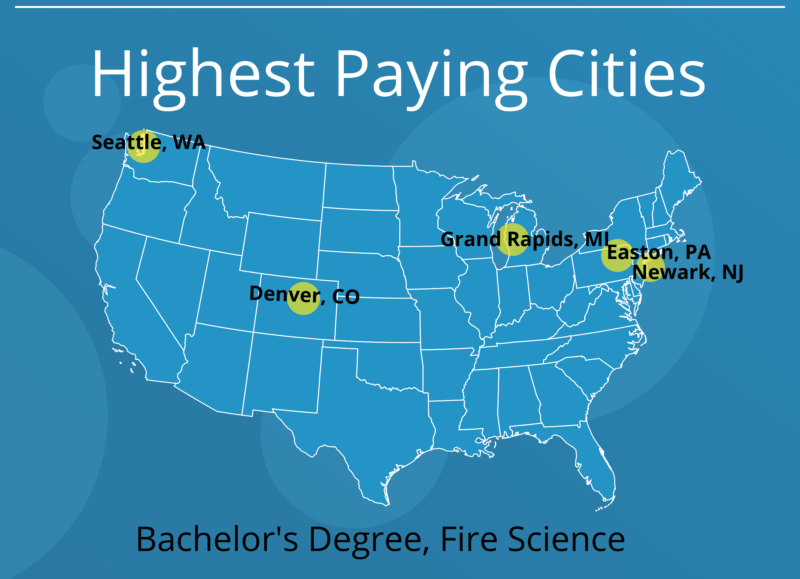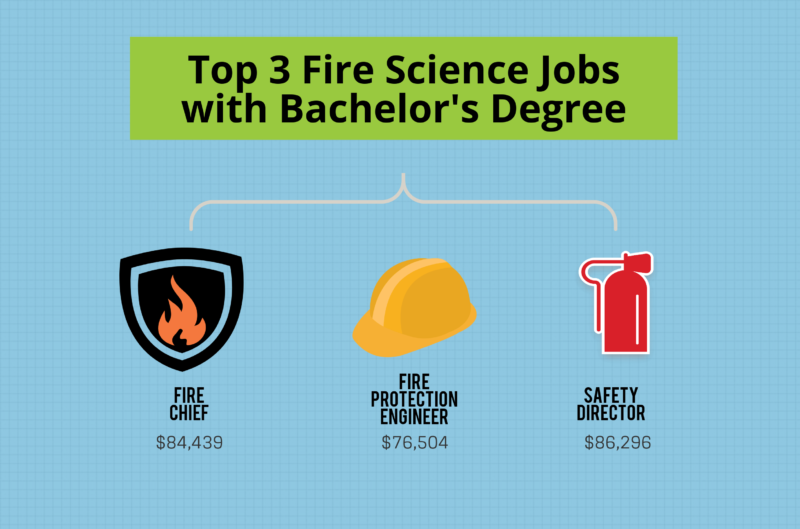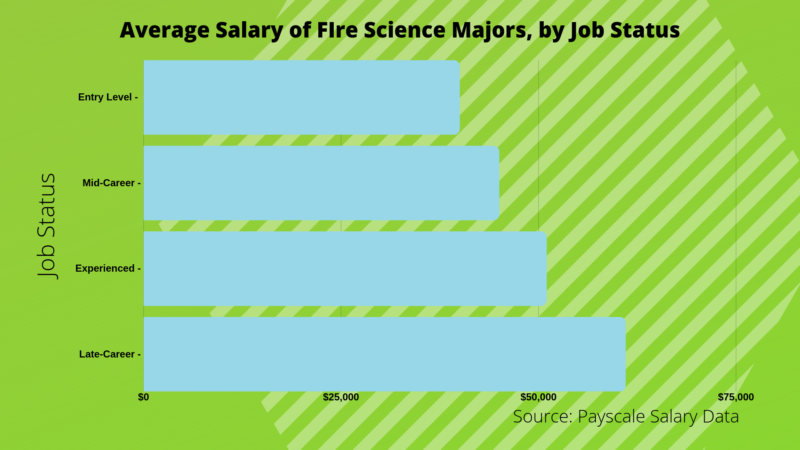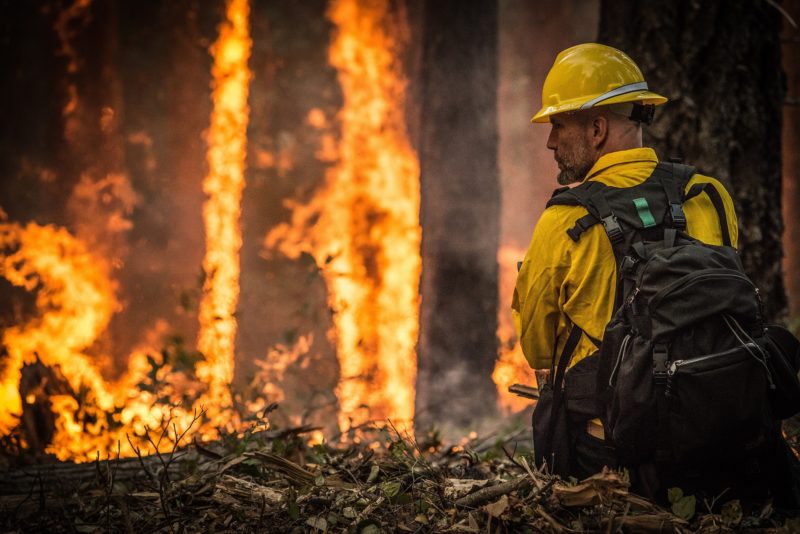Key Information:
- A fire science degree opens up various career paths, including firefighting, fire prevention, fire protection, and fire investigation. It prepares professionals to understand fire behavior, use firefighting technology, and manage fire safety.
- Accreditation by recognized organizations like FESHE is crucial for ensuring the quality of fire science programs.
- Fire science degrees offer specializations in firefighting, fire prevention/protection, and fire investigation.
- Many programs are available online, offering flexibility for students who need to balance their studies with other commitments.
Growing up did you wonder — What does a fire chief do? And, do you now ask yourself — What can I do with a fire science degree?
The ultimate objective of fire science (and its sister field, fire research) is to improve available fire suppression and fire prevention techniques that are used in training firefighters and supporting professional firefighters on the job. The results obtained from fire science research are used to modify professional fire and emergency services training programs, as well as the tools and techniques for firefighters on the front lines. In the age of wildfires and domestic terrorism, fire science is crucial.
Fire science’s primary mission is to protect people and property from the potential damage and destruction caused by a fire event. The field of fire science is quite comprehensive and includes the disciplines of Fire Safety, Firefighting, Fire Science Technology, Fire Prevention, and Fire Protection, among others.
Related:
- Best Online Fire Science Degree Bachelor’s Programs
- Best Bachelor’s in Fire Science Degree Programs
- Fastest Online Fire Science Degree Bachelor’s Programs
- Most Affordable Fire Science Degree Bachelor Programs

A more technical fire science definition would read as follows:
Fire science is a specialty discipline that integrates both science and engineering doctrines as a means to better understand the causes, the effects, and the byproducts of fire. Fire science examines the concept of fire from many perspectives — from fire prevention to fire investigations.
Earning a fire science degree opens up many career opportunities. A partial list of possible fire service-related industries includes
- Fire Behavior
- Fire Department Administration
- Fire Investigations & Analysis
- Fire Prevention
- Fire Protection
- Fire Safety
- Fire Science Technology
- Fire and Emergency Services Administration
- Hazardous Material Handling
School/Program Accreditation for Fire Science
It can be a bit daunting to research schools and degree programs when preparing to further your education in fire science and fire services administration. This is because there are an overwhelming amount of schools and degree programs from which to choose. And if that was not complicated enough, there are many other factors to consider for each school and each degree program.
Fortunately, there are ways to help sort through the mountains of information available to students vying for a post-secondary degree. Begin by determining if the schools of interest have received accreditation — a designation that denotes the school (or program) has met or exceeded industry educational standards.
School accreditation is recognized as one of the most relevant factors when evaluating the quality of the school/program as it is performed by a neutral oversight organization. With reference to the field of fire science, most students seek out FESHE-recognized schools or programs. A school’s accreditation is often a critical factor because many potential employers only hire graduates of a FESHE-recognized school or program.
Accreditation Types
There are several levels of accreditation that evaluates post-secondary institutions of higher educations and the degree programs they offer. The broadest accreditation occurs at a national level.
National Accreditation
The US Department of Education (DOE) is tasked with the responsibility of accrediting those schools with the minimum education standards for the nation as a whole. The DOE assesses each school against pre-determined education benchmarks defined the nation’s education leaders. Any reputable institution of higher learning should be nationally accredited. Employers require, at a bare minimum, a school to have received national accreditation.
Regional Accreditation
Regional accreditation is a more focused oversight program. Regional accreditation is generally preferred by most employers but is not always necessary. Additionally, the process of regional accreditation is strictly voluntary, and can only be initiated by a school or university. Each regional accrediting agency covers a defined area. As such, there are many regional accrediting across the United States.
In addition, there are numerous sanctioned accrediting organizations that accredit industry-specific schools and program. This type of accreditation is discussed below.
Industry and Program-Specific Accreditation
Generally speaking, each industry uses an approved oversight agency (or two, or three for larger industries) to ensure the industry-related programs and schools meet basic industry guidelines and training credentials. In the fire science industry, the primary oversight organization evaluating program standards and school is the Fire & Emergency Services Higher Education network. This network is detailed below.
The Fire & Emergency Services Higher Education (FESHE) Network
FESHE’s mission is to reduce the loss of property and the loss of people from a fire occurrence. The Fire & Emergency Services Higher Education (FESHE) Network is the brainchild of the United States Fire Administration. FESHE’s fundamental objective was to establish a set of standards for fire officers and firefighters regarding the implementation of higher education standards. These elevated standards are designed to reduce the damage and destruction of fire events.
Some of FESHE members’ have made remarkable contributions in many ways:
- Coordinating projects with the National Fallen Firefighters Foundations
- Creating a professional development matrix model upon which degree and training programs can refer
- Defining outlines to be used by fire science course developers
- Developing a national fire science professional model
- Partnering with publishers to ensure textbooks comply with the FESHE model plans
- Setting the industry guidelines that define the minimum standards of collegiate educational degree programs
Types of Fire Science Degrees
A fire science degree is available in a wide variety of specialties and concentrations. Many online fire science degrees focus on a first-responder curriculum, while others follow a more Bachelor in Emergency Management-related curriculum. Any way you slice it, a Fire Science Bachelor Degree is a great educational stepping-stone toward a rewarding career in the fire science industry. Students may study full-time or part-time, in either on-campus or online learning environments.
Fire Science Bachelor degrees are loosely categorized into three groupings. The degrees of fire science include Firefighting, Fire Prevention/Protection, and Fire Investigation.

Firefighting
The best degrees for firefighters prepare professionals by teaching students to understand the concept of fire theory, to properly use firefighting technology and equipment, and demonstrate an understanding of the principles of pumps, technical apparatus & victim recovery. Some of the best degrees for firefighters are available completely online and often as a hybrid delivered program, though traditional on-campus programs have their advantages – especially in making job-market connections.
Many professionals choose to earn a Fire Administration Degree to obtain positions of leadership and policy-making. Many top fire science colleges offer a certificate of fire safety or a fire safety officer course as a means to advance one’s career. Students earning an online fire administration degree are qualified for fire safety managerial positions. Even top fire science colleges offer fire science degrees online for students who require a more convenient and flexible option.
Fire Investigation
A fire science degree that emphasizes a fire investigation curriculum explores the many cutting-edge techniques that help determine the causes and evaluate damages from a fire event, in addition to the appropriate handling of material evidence. This includes arson investigations, fire codes, and fire hazards.
Students interested in specializing in fire investigations will find that fire science bachelor degree colleges now offer online fire science degrees with a fire investigation specialty. The fire science degree requirements for entrance into a fire science degree program generally include a high school diploma or an equivalency credential.
Fire Protection and Prevention
An emergency management degree that emphasizes fire protection and prevention integrates the construction industry with the tech-oriented/engineering-related field of fire protection and prevention. A fire science bachelor’s degree in fire protection is often offered by some of the best colleges for fire protection engineering.
A fire science bachelor degree in fire prevention and protection very often includes a certificate in fire safety and a fire safety officer course option, in addition to its standardized curriculum. Additionally, many top fire science colleges offer accredited online fire protection courses as a part of some of the best online fire science degree programs.
Fire science is also the study of fire protection and prevention. Fire science involves the construction industry’s principle beliefs in relation to fire safety standards. These construction concepts are very much a part of a fire science degree program. Fire science also explores the principles of hazardous materials’ management.
The bottom-line: A Bachelor in Emergency Management degree offers many career options within the field of fire science and emergency services.
Note — With the recent popularity of MOOCs — Massive Open Online courses — many degree program coursework is now available to anyone who owns a computer and has Internet access. And while there are free online fire courses with certificate programs offered, there is a cost to obtain a copy of the written certificate. Be certain to read the fine details for any free online fire courses with certificate offering.
Certifications/Licenses for Fire Science & Emergency Administration
Firefighting is a risky business. As such, firefighters and fire science professionals must meet professional standards and the physical demands of the job. Both professional and volunteer firefighters must demonstrate the physical fitness required of this position.
Of note, volunteer firefighters account for about 2/3 of all firefighters in the country.
Licensure
While there are no specific industry licenses issued to become a fire professional, an applicant is required to write to the fire department of their choice to schedule a test of one’s physical abilities. The physical part of the exam is designed to determine if the interested party is capable of managing what can be enormous amounts of physical efforts firefighters endure.
Training and Certification
While each state’s regulations vary, many states require the more elevated positions of a Fire Investigator, Fire Officer, Fire Chief, and Fire Inspectors to hold appropriate certification. Typically, fire science certification is earned through successfully completing a fire science certificate online NFPA (the National Fire Protection Association) program or an NFPA- based program at a local professional school. At any degree level (even a master’s degree) professionals in emergency response can benefit from further training and certifications.
NFPA — The National Fire Protection Association
The National Fire Protection Association is a nonprofit advocacy group that was found in 1896. NFPA membership exceeds more than 50,000 members. The NFPA operates independently of any government, as it is globally self-funded. NFPA’s mission is to mitigate
- Economic Loss
- Injuries
- Loss of Life
- Loss of Property
The National Fire Protection Association organizes and disseminates information across the world regarding fire safety standards, fire science research, firefighting training, and fire science education, through conferences, advocacy partners and members.
Additionally, the NFPA provides grants and awards for achievements such as:
- Distinguished Contributions
- Fire Loss Advocacy
- Fire Science Educator of the Year
- Technological Development in Fire Safety
There are many affordable fire safety certification online programs that meet the educational standards set forth by the National Fire Protection Association; however, many employers offer to absorb the cost of the program, essentially making the fire safety online training free.
NFPA Certification
The National Fire Protection Association has set forth standards for several levels of certification for fire officers. Each school that offers fire safety certification online courses makes the decision as to which of the NFPA online certification courses to offer.
- Fire Inspector Certification (Both Levels)
- Fire Plan Examiner Certification
- Fire Protection Specialist Certification
- Other Professional Certifications
The fire industry offers other certifications through these industry professional organizations and oversight agencies, including the National Association of Fire Investigators and the International Association of Arson Investigators.
Students are advised to determine if these professional organizations offer any fire safety online training free programs.

What Jobs Can You Get with a Fire Science Degree?
What jobs can you get with a fire science degree? Many firefighters and EMS or EMT (emergency medical technician) professionals begin with a high school diploma or associate degree (AAS) from community college. That’s fine for entry-level public safety careers. But through experience and earning certifications/advanced degrees, a fire professional can advance to the upper levels of jobs within the fire department. These elevated fire department jobs include fire science degree jobs like Fire Chief, Fire Captain, and Fire Investigator among others. So what can you do with a fire science degree?
Fire professionals typically prep for their firefighting career by attending a fire academy (or another training facility). Graduates who hold a fire science degree enter the fire jobs market prepared for the many fire jobs in the field of fire science and firefighting. Jobs within the fire department include:
- Arson Investigator Jobs
- Fire And Emergency Services Administration Jobs
- Fire Inspector Jobs
- Fire Protection Engineer
- Fire Protection Engineering Jobs
- Fire Safety Engineers
- Fire Service Administration Jobs
- Fire Marshal
- Emergency Medical Services Director
As a reminder, many specific fire department jobs require the attainment of industry certifications and advanced fire science degrees. These include:
- Arson Investigator Jobs
- Fire Inspector Jobs
- Fire Protection Engineering Jobs
- Fire Safety Jobs
Where Do Fire Science Professionals Work?
Other than rural areas that operate with mostly volunteer firefighters, most professional firefighters are employed by either a government agency. However, some fire professionals work in large factories and even airports. A fire protection engineer that attacks forest fires by air is known as a smoke jumper. As one can see based on just this example, it is challenging to find a consistent fire safety officer job description across the board.
Local governments employ most firefighters, but some work in airports and factories. Woodland firefighters are specifically trained to put out fires and forest environments and a firefighter in the position of smoke jumper puts out forest fires from the sky. A fire science career can take you nearly anywhere!
Fire science degree jobs often require fire professionals, like a fire protection engineer, will often spend time in the field conducting inspections & research, educating the public regarding fire safety issues and fire safety laws.
There are many other career paths as well:
- law enforcement
- paramedic
- criminal justice
- homeland security
- wildland protection
- building codes
Salary Expectations for Fire Science Degree Holders
The average fire science degree salary differs based upon experience, education level, and certifications achieved, as well one’s exact title/responsibilities. Have you considered the following?
How much does a fire chief make? Or,
How much is a fire inspector salary?
The following fire-related careers will have different compensation packages, according to Payscale data:
- Fire Administration Salary – $54,000
- Fire Captain Salary – $75,000
- Fire Inspector Salary – $52,000
- Fire Investigator Salary – $57,000
- Fire Safety Officer Salary – $58,000
Firefighter Income Facts
According to the Bureau of Labor Statistics (BLS), a firefighter’s median annual income for 2018 was about $49,600. This would include a fire safety officer salary as well. The general job outlook for jobs with a fire science degree is 7% through 2026; a job outlook that compares to the national average of all jobs.
According to the Bureau of Labor Statistics (BLS), the more advanced fire technology degree jobs within the fire industry, such as a fire inspector, the median salary for was $60,000 per year. Fire science degree jobs salary varies, but usually gives graduates a good living.
Have you asked yourself — Where are the fire protection jobs near me? Researching the fire industry job statistics in your community easily provides the answer to this question. The research will also answer the questions — How much does a fire chief make, and which communities are hiring fire industry professionals.

Professional Organizations in Fire Science, Safety, and Prevention
Most industries maintain professional organizations, which help further the profession by supporting safety standards and member professionals. The fire science industry has several professional associations that offer job boards, networking opportunities, education and training, and community outreach programs to member companies and member professionals. They are the International Association of Fire Fighters and the National Fire Protection Association.
The National Fire Protection Association
The National Fire Protection Association (NFPA) is a privately funded nonprofit association created to reduce the loss of life, loss of property and economic loss caused by a fire event. Membership provides members with the most up-to-date fire science industry news, an integrative network of professional fire professionals, and access to the NFPA’s staff regarding issues or information.
Since the end of the 19th Century, the National Fire Protection Association has taken the lead as one of the primary fire science organizations in terms of:
- Advocacy
- Community Outreach
- Fire Safety Training
- Fire Safety Research
- Hazardous Material Handling
- Worldwide Conferences
The National Fire Protection Association Publications
One of the ways the NFPA supports the fire science industry is in its proprietary publications. These publications include:
- The NFPA Journal-Dedicated to fire science industry news; issued every other month exclusively to members
- The NFPA Journal Buyers’ Guide – A comprehensive consumer guide devoted to significant buyer concerns regarding fire products, and fire prevention
- The NFPA Journal Latinoamericano – The top source in Latin America for information regarding fire safety, fire protection, and life safety issues
- The NFPA Online Catalog– A downloadable, sortable catalog of NFPA’s standards and codes, and education materials for the public. This information is offered free of charge
- NFPA’s Codes & Standards
The National Fire Protection Association is most widely known as the organization that set forth the basic industry standards and codes designed to improve fire safety procedures and reduce the damage and loss caused by a fire event. A revision process that has received accreditation from the American National Standards Institute (ANSI) refines the 300 existing codes and standards on an ongoing basis.
The International Association Of Fire Fighters
The International Association of Fire Fighters (IAFF) was established with a mission to help protect and support IAFF members — the professionals who place their lives on the line every day to save others — and the neighborhoods and communities they work within. For example, each year, the IAFF Foundation awards scholarships and grants to forty students across the country to facilitate their post-secondary education expenses.
IAFF members are the first responders who are first on the scene for disasters that include:
- Acts of War/Aggression
- Civil Disturbances
- Natural Disaster like floods, tornadoes, hurricanes, and tornadoes
The International Association of Fire Fighters offers support immediately following mass tragedies and natural disasters by delivering food, water, clothing, shelters, and financial relief. The IAFF Foundation is ready to support the spouses and families of fallen firefighters by issuing financial assistance to the children of the fire professional who has made the ultimate sacrifice.
The IAFF Fallen Firefighter Annual Memorial
Since, 1918, the IAFF Fallen Fire Fighter Memorial happens each year as it honors the firefighters who have lost their lives in the line of duty. To access each year’s Wall of Honor follow this link.
When an IAFF member or family member suffers a burn injury, the Foundation provides financial assistance and a peer support network to ensure they receive proper care and treatment with their families by their side.
The IAFF International Burn Camp
The IAFF International Burn Camp is held each year in the nation’s capital. The burn camp is a 7‑day workshop for burn survivors with counselors specialized in training that changes these teenage lives.
Related Professional Associations
- The National Association of Fire Investigators
- The International Association of Arson Investigators
